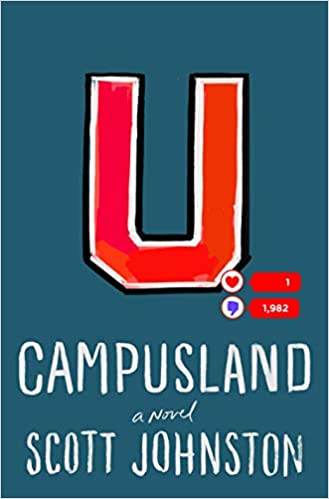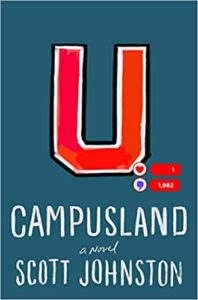

In Rules for Radicals, Saul D. Alinsky’s handbook for left-wing activists, Alinsky gives thirteen rules for community organizers. Rule number four is “Ridicule is man’s most potent weapon.” That rule is relevant for fighting wokeness on campus. And Scott Johnston, author of Campusland, a novel published in 2019, understands that.
Usually people’s first novels aren’t good, but Johnston’s is a gem. With all the wokeness and intimidation happening on U.S. campuses in the last few years, we were due for such a novel that incisively makes fun of wokeness. Nothing in Johnston’s resume suggests that he would have done a good job. He worked at Salomon, opened some nightclubs in New York, and founded two tech start-ups. It’s true that he has written books on beer drinking and golf betting games, but that doesn’t seem like a straightforward way to become a first-rate novel writer. Yet the novel is first-rate and, although it’s humorous, it’s more profound than that. It’s about Ephraim Russell, a young assistant professor of American literature who teaches at fictitious Devon University, a small elite private university with a multi-billion-dollar endowment. Russell is up for tenure and his odds seem good. But while teaching The Adventures of Huckleberry Finn, a novel about which he is passionate, he gets caught in the buzzsaw of phony charges of racism. When we remember a real-world story about a professor teaching Chinese to a class at UCLA getting in trouble for pronouncing a Chinese word that sounds awfully like the N-word with a -ga at the end, it’s completely believable that Russell would get in trouble for teaching a novel in which the actual N-word is used repeatedly. Will this affect his chances at tenure? Obviously yes, but enough to torpedo his chances? I won’t tell you.
These are the opening two paragraphs of David R. Henderson, “Campusland: A Delightful Book Delivers,” AIER, July 7, 2021. The main way it overlaps with my earlier EconLog post on the book is in the discussion of the effects of raising the legal drinking age to 21.
Another excerpt:
When I read the book and started to understand the motivations of the various players, it was like watching two trains twenty miles apart hurtling towards each other on a single track. You just know they’re going to collide and you wonder how destructive it will be. One major difference, though, makes my metaphor imperfect: free will. People can make different choices and when one person in particular makes a different choice because of his particular incentives and not because of any residue of integrity, it greatly affects the outcome.
A fun excerpt on Hayek:
The novel is full of nice little touches. Here’s one of my favorites, a few lines that Ephraim overheard at the Faculty Club: “So I had this student who wrote a paper—a paean, really—to Hayek. Can you imagine? Does he think this is Chicago? Who does this kid think he is?”
It’s a nice touch, partly because it’s funny but mainly because I can just picture the dreamkiller in the faculty lounge trying to squelch the excitement of an undergrad.
Read the whole thing.
By the way, they didn’t use the bio I sent them. Here it is:
David R. Henderson is an emeritus professor of economics at the Naval Postgraduate School and a research fellow with the Hoover Institution at Stanford University. Fortunately, in his 38 years of teaching at various universities nothing like what happens in Campusland happened to him.

READER COMMENTS
Mark Z
Jul 8 2021 at 8:31pm
The Hayek remark is amusing, as it reminds me of my undergrad professors and TAs. One made a remark like that (only more overtly derogatory) about Friedman pertaining to the reading assignment right at the start of a class discussion, so it kind of ‘poisoned the well’ for any opposing viewpoint. That kind of pre-emptive expression of disdain was pretty common for many of my professors when starting a class discussion about politics. Suffice it to day students seemed reticent to express serious disagreement in discussions. And that was over a decade ago.
David Henderson
Jul 9 2021 at 11:10am
Thanks, Mark Z.
Amusing, as you say, but also, for the reason you give, very concerning.
As a teenager, when I thought about college, I thought it would be this place that was open to new ideas. When I got there, I found that that was true in my English literature class and in (some of) my philosophy classes. But not at all in my one econ class. All of these were at the University of Winnipeg. Although, to be fair, the econ professor seemed to be going through the paces and didn’t even seem to have a strong commitment to his own ideas.
Fazal Majid
Jul 10 2021 at 4:22am
Remember this next time you read a self-serving paean to “the humanities” (usually meaning English lit, philosophy and other useless rhetorical subjects, not history or music). Ultimately, live by the sword of ideology, die by that sword.
Comments are closed.